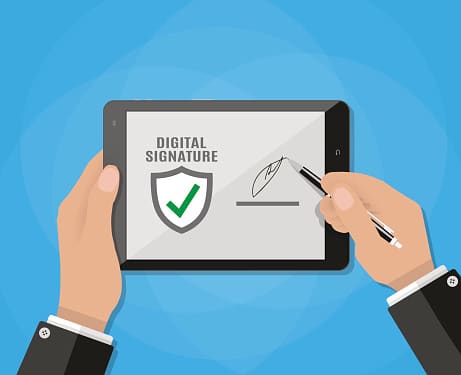Year by year, technology continues to advance and provide greater benefits for members of the business and consumer worlds alike. Some advancements – like cloud computing – are monumental, world-changing paradigm shifts.
Others, such as electronic signatures, may not change the world per se, but they’re still important. The ability to sign a legal document electronically can mean more than you may think.
After all, any opportunity to go paperless is worthwhile. You save money on the cost of materials, the space to store them safely, and that’s not to mention the benefit to the environment.
But before getting too far into the reasons why, let’s answer a basic question…
What Is An Electronic Signature?
Put simply, electronic signatures are a legal, safe way for parties to sign documents – all without the need for a pen, paper, and everything else that goes along with it.
While there are a few different types of electronic signatures that suit different types of documents and agreements, the basic idea remains the same. Whether signing a lease or a service-level agreement, electronic signatures are an easy way to get it done properly.
What Are The Top 5 Reasons To Start Using An Electronic Signature Solution?
- Eliminate Unnecessary Expenses.
As with nearly any other transition from an analog to a digital medium, one of the key benefits is that you get to reduce and often eliminate an otherwise pointless cost. In this case, you get to go paperless for each and every form and legal document you used to rely on. That means you save money on the cost of paper, ink, printer maintenance and shipping costs. That’s not all though. There are also indirect benefits in how you and your team will save time that would’ve been spent filing documents, rekeying data, trying to find physical, lost documents, and similar unnecessary tasks. - Improve Customer Relations.
The simple fact is that your customers will generally appreciate when improvements are made to the way you do business with them. Whether it’s an overhaul of your entire IT infrastructure, a new website, mobile-friendly enhancements, or something as simple as a new electronic signature solution, any improvement will likely better serve your customers the way they would prefer. After all, today’s customer prefers to get things done quickly conveniently. The less of their time that you take up, the better. By using an electronic signature solution that allows them to sign contracts online without having to download, install, or print anything, you ensure a minimal demand on their time and patience. - Achieve Improved Timelines.
Another benefit of getting your documents signed quickly and remotely is that you eliminate the otherwise expected waiting period between issuing a contract and getting it signed. Whereas at one time you would have to draw up the document, get it couriered to the right person, have it signed and then brought back, with an electronic signature solution, all that goes out the window. As soon as you have the digital copy prepared, it can be sent to and signed by the required parties in minutes. What does this mean for you? Often, it’ll mean you get paid faster, which greatly speeds up the sales cycle. - Enhance Security.
This is a no-brainer, right? Digital documents, signed or unsigned, cannot get lost in the mail, or stolen by third-parties. Not easily, at least. Instead of a locked filing cabinet, your vital business documents can be password protected and encrypted, both of which protect against prying eyes and ensure only authorized parties can view it. Furthermore, digital documents are not flammable, or prone to water damage, as their analog counterparts are. Another key benefit of electronic signatures (and the digital documents that use them) is that they’re far more protected against onsite emergencies than physical documents are. - Keep Track Of Progress.
Ever wondered whether something has been signed yet? Not sure if you would be made the person in question angry by giving them a call to check? With electronic signatures, you don’t have to worry and wait anymore. You can easily track your documents via updates, notifications and an online dashboard that will keep you abreast of each and every stage of the process.


